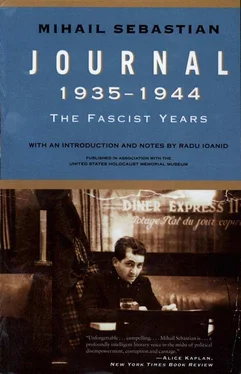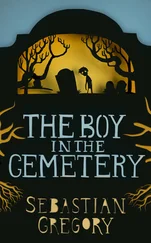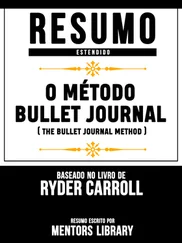He suggested I become editor of a paper he is planning to bring out with Zaharia Stancu, under their management. I told him that I don’t do journalism. But why didn’t I say how impudent the proposal seemed to me? What the hell! Is that my “value” as a writer? Maybe Carandino thinks it natural for him and Stancu to put me on their payroll? It’s very disturbing.
I met Ion Barbu in the street. It was the first time we had greeted each other for six or seven years. For six or seven years he simply did not recognize me. But today he hurried over to me, opened his arms wide, and effusively held out his hand.
“You were right!” he shouted to Carandino and myself.
(That’s all: “You were right!”—as if it were a game of chess or checkers in which he had made the wrong move.)
But he added with melancholy, with regret:
“The mistakes they made were too great. Hitler proved a dilettante. They shouldn’t have left him in charge. If they hadn’t removed Brauchtisch. .”
A letter from Titel Comarnescu:
“To Mr. Mihail Sebastian, writer and editor at the Revistă Fundaţiilor Regale,
"Dr. Octavian Neamt.u and colleagues at the R.F.R. invite you to resume your post as editor at this review. Would you please come to the Foundations on Wednesday at 4 p.m. (Bd. Lascăr Catargi), where you will make contact with the management committee.”
I haven’t replied — but I don’t think I’ll accept. I have been in doubt all day. ( Mauvais signe! ) 6I asked Belu, Aristide, and Zissu what they thought. ( Autre mauvais signe. ) If your mind is made up, you don’t ask anyone else. Is it possible that I have the slightest hesitation? Isn’t the disgust in me strong enough to stifle any remaining doubt?
I feel incapable of writing there again. It’s dead, and that’s how it should remain.
When I met Şerban Cioculescu by chance, he took from his pocket a memorandum signed by thirty members of the SSR, the Writers’ Association; it calls for the holding of a general meeting to elect a new committee (democratic, of course) and to reintegrate Jewish writers.
I read the piece of paper and handed it back without a word. It doesn’t interest me. Sincerely, without posturing or an ounce of exaggeration, it doesn’t interest me. It was hard to explain this to Cioculescu, nor did I try. But as he insisted that I must come to the general meeting, I told him that I wouldn’t be coming. Is it possible that he, who is neither a fool nor a complete lackey, cannot see how grotesque the whole situation is?
The new president of the SSR will be Victor Eftimiu. His name is everywhere: at the theatre, at the Writers’ Association, at the association of property owners who have suffered war damage (where Paltin says that he gave a thundering speech on Sunday about the revolutionary spirit).
A salty detail. Cioculescu suggested to Eftimiu, the likely president, that the new committee of the SSR should include “from the Jewish writers, F. Aderca.” To which Eftimiu replied: “But why? They should be pleased we’re having them back.”
A taste for pamphleteering alternates in me with a kind of helpless disgust. Sometimes I shudder with an urgent need to speak out against all the shameless posturing, against the whole farce being acted out around us. But then I remember that it doesn’t concern me. What am I supposed to do in this great Balkan swamp?
Yesterday at Beate’s I met two Soviet writers: Boris Epstein, a thirty-year-old captain and Pravda drama critic, and Yura (I don’t remember his surname), a twenty-two-year-old sublieutenant and poet. Both are editors at a front-line paper. They moved on this morning.
Boris spoke German badly, Yura French badly. Both had an expression of humanity (a little melancholic in Boris, more youthful in Yura), which was impressive after the faces of Soviet soldiers in the street, bons enfants 7but wild.
I saw Branişte on Sunday. He was reserved, discreet, buttoned up. No mention of our old vows to work together. Not a word about his plans for the future.
He is scared of the Russians, worried about the Communists. He strikes me as irredeemably the chief editor at Adevarul and Dimineata.
It is strange that I haven’t noted anything for so long about the course of the war. I have no radio, I read the papers without attention, and above all I don’t have a map. (All our maps were destroyed at Strada Antim.)
The war has interested me less since I felt the outcome was settled. The peace preoccupies me more. I think that Germany will be finished in six or seven weeks. I can’t see it lasting beyond November.
But some think that the game is not yet over. Enescu 8surprised me today when he said that all we risk by uncovering the Steaua fără nume mystery is execution if the Germans return to Bucharest.
“Do you think that’s possible?” I laughed.
“I don’t myself. But there is a lot of talk of a new German offensive, from Timisoara.”
Nearly the whole of France has been liberated, half of Belgium, plus Luxembourg and the Netherlands. The Siegfried Line has been breached at numerous points. Aachen is within range of Allied machine guns. Can anyone really still imagine a “German offensive”?
Anything can be imagined in this big wide world.
We are always on the move. Today we left our temporary accommodation on Bulevardul Carol for another temporary accommodation in Strada Dmitrie Racoviţă. I don’t know when this “waiting room” life will be over and we will again have somewhere to call home.
I am still, above all, a war victim.
I am not willing to be disappointed. I don’t accept that I have any such right. The Germans and Hitlerism have croaked. That’s enough.
I always knew deep down that I’d happily have died to bring Germany’s collapse a fraction of an inch closer. Germany has collapsed — and I am alive. What more can I ask? So many have died without seeing the beast perish with their own eyes! We who remain alive have had that immense good fortune.
And now? I don’t know.
And now, life begins. A kind of life, which has to be lived. The only thing for which I longed was freedom. Not a new definition of freedom — but freedom. After so many years of terror, we don’t need to have it explained to us what freedom is. We know what it is — and it cannot be replaced by any formula.
There are certainly miserable tricks, farces, impostures. There is Victor Eftimiu, with his impudence, his bad taste, his eternal vulgarity. There is young Macovescu, 9who had a comfortable life under the Germans and is now a fierce Jacobin. There is Graur, obtuse, dismal, triumphant. There are thousands of incidents and happenings that offend you. There is a frightening spirit of conformism, new in its orientation but old in its psychological structure.
But over and above everything, there is the one redeeming truth: the Germans are done for.
I had lunch at Byck’s with Belu, Rosetti, and Vişoianu. We waited for Vişoianu with lively interest, as he had just been to Moscow for three days as a member of the Armistice Commission. 1Very interesting things, told by an intelligent, free-minded man without prejudices. I am too tired this evening, but I’ll try to note something tomorrow.
A lot of sadness in Russia — Vişoianu says. He didn’t see anyone smiling in the street. But, as he himself added, there is a certain sadness in the big Slav cities. Moscow is sad, as Warsaw was too in peacetime.
Читать дальше











